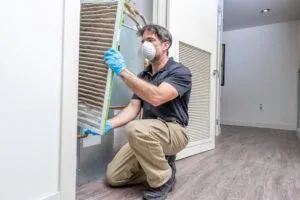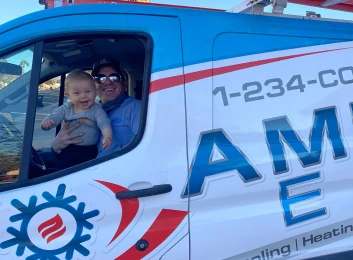
Although commercial and residential HVAC systems generally have the same goal of keeping you comfortable, these systems are very different due to their components, parts, sizes, and more. Therefore, while they both heat, cool, and ventilate your home or business, they have several differences, making one more beneficial for large buildings and the other more beneficial for small private homes.
You should always consult an HVAC company about the type of HVAC system you need for your space. In the meantime, you may be interested to know some of the differences between these systems so you can better understand yourself. Below, we will review seven important differences between commercial and residential HVAC systems.
1. The Size of the System
One of the main differences between commercial and residential HVAC systems that people are aware of is the size. A residential HVAC system is a lot smaller than a commercial HVAC system.
Your home is likely much smaller than your work location or business. Therefore, for your commercial HVAC system to keep your company building comfortable year-round, it must be large and powerful enough to reach the entire space. If you choose the wrong type of system for your space, you will risk your HVAC system breaking down quickly because it will either run too much or cut on and off often.
2. Where Your System Is Placed
A residential HVAC unit is typically smaller than a commercial one. That said, your residential unit can be placed securely in your backyard or another hidden place away from your family and guests. However, commercial HVAC units are usually installed on the roof of the building due to their large size and noise.
In addition, many commercial buildings do not have yards, meaning that a technician must find a secure place for your HVAC system. While it may seem like a hassle to have a professional place your HVAC unit onto your company’s roof, this will help you reduce the excessive noise and keep the system away from your customers and workers.
3. The Structure and Complexity
Residential and commercial HVAC systems are also very different regarding structure and complexity. Commercial systems are created to be more flexible depending on the type of business or establishment, the number of employees and customers using the building, and whether or not the system will be used continuously. Therefore, most people will notice that commercial HVAC systems are much more complicated and have additional parts and functions.
4. How the System Drains
No matter what type of HVAC system you have, it will produce and release moisture. Some people may be confused and concerned about this, but it is normal. However, the moisture needs somewhere to drain, meaning pipes should allow the moisture to flow out.
Residential HVAC systems usually have one small pipe leading to the yard, but commercial HVAC systems have multiple drains. This is because commercial HVAC units are much larger than residential units, producing more moisture that needs to be properly drained. To keep your unit functioning efficiently, it must have the correct number of pipes to drain which will also prevent overflowing.
5. The Type of Equipment
Your HVAC equipment is made up of different elements within the system. Therefore, the equipment will differ based on size and needs when you have a commercial or residential HVAC system. The equipment of a residential HVAC unit is mostly simple, but commercial systems are typically altered and customized to adapt to the area that it needs to heat and cool off.
6. Maintenance Expenses
Your maintenance expenses will depend on the type of HVAC system you choose for your needs. Commercial HVAC units tend to cost more because of their size and complexity. They also need to be inspected more often.
That said, your residential HVAC unit will most likely be more affordable to maintain because it is simple and doesn’t require as many repairs or inspections. However, regardless of which type of system you have, it should be routinely maintained and kept up to date by a professional technician.
7. How Much Energy Is Used
As you might expect, commercial HVAC systems are more powerful than residential HVAC systems. This is because a commercial HVAC system has to keep a large space cool and warm for employees and customers throughout the day. This means that a commercial HVAC system will use a lot more energy and power when compared to a residential HVAC system.
Which HVAC System Do I Need?
If you are looking for an HVAC system for your house, purchasing a residential HVAC system will take care of your heating and cooling needs within your private home. However, if you are opening a new business or company with much space, you will most likely benefit from purchasing a commercial HVAC system instead. These two systems are not meant to be interchangeable.
Therefore, you are not recommended to use a residential HVAC system for your large commercial space or a commercial HVAC system for your residential space. A residential HVAC system will not be strong enough to heat or cool down a large building, and a commercial HVAC system will be too large and powerful for a small home.
Contact Ambient Edge for Any of Your HVAC System Questions and Concerns
Suppose you are still unsure about the type of HVAC system you need. In that case, contacting a licensed and professional technician from Ambient Edge as soon as possible is highly recommended. Our team is experienced, skilled, and knowledgeable about different types of HVAC units, and we are always available to answer any of your questions and concerns.
We can also schedule an appointment to meet with you or travel to your business or residential location to determine the best HVAC system for your space. Call our office or contact us today to get started on the process. We are ready to handle your needs and ensure your environment remains comfortable all year.When you need the best commercial air conditioning repair in Lake Havasu, AZ, turn to Ambient Edge. Our fast, reliable team is available to answer all of your questions and schedule a service call to visit your location. Complete our contact form today to schedule an appointment.



